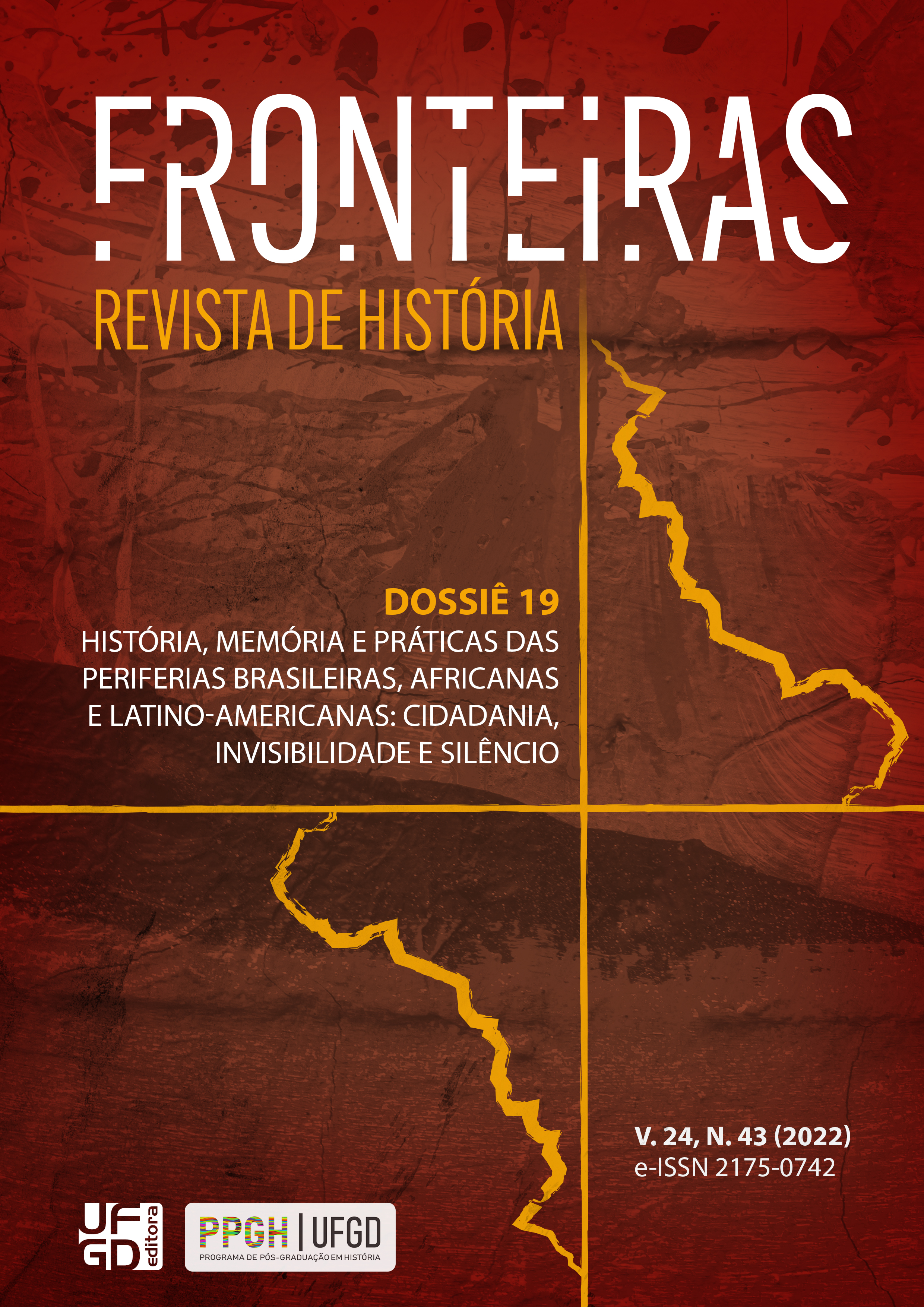The woman of the street speaks: narratives of the feminine and peripheral knowledge with the pombagiras
DOI:
https://doi.org/10.30612/frh.v24i43.15985Keywords:
Keywords: Pombogyric Movement; woman, relationshipAbstract
This article is part of an investigation in process that invests in thinking about the narratives and practices related to the pombagira sign. The problem proposed here is located in the dimensions of the feminine, its relations to multiple forms of production of deviation/sign inscription. We chose a subalternized political identity that enunciates from the peripheries of the world to highlight the multiple faces of the feminine and its daily battles or, as we prefer to call, “feminisms that have no name”. Thus, this text addresses dialogues with narratives about the pombagiras, their presence, knowledge and transits expressed in the field of research, conversations with pombagiras practitioners of umbanda and candomblé terreiros. We propose a reflection on how to be a woman from the various aspects of the feminine that the inscriptions of the pombagira sign reveals. These performances expressed in multiple ways open paths to responses to oppression and gender inequality, not from an automatic confrontation, but in the movement of tactical wisdom that displaces the impositions based on machismo/patriarchy/racism/colonialism.
Downloads
References
FEDERICI, Silvia. Reencantando o Mundo: feminismo e a política dos comuns. São Paulo: Elefante, 2022.
FERNANDES, Dalvana; FAVARO, Jean Felipe. Sexualidade feminina no contexto religioso umbandista: a transgressão do ordinário sob o arquétipo da pombagira. In: Seminário Internacional Fazendo Gênero 11 & 13th Women’s Worlds Congress (Anais Eletrônicos), Florianópolis, 2017.
GLISSANT, Édouard. A poética da relação. Rio de Janeiro: Bazar do Tempo, 2021.
KRAMER, Heinrich; SPRENGER, James. O martelo das feiticeiras. 29 ed. Rio de Janeiro: Rosa dos Tempos, 2020.
MARTINS, Leda Maria. Performances do tempo espiralar, poéticas do corpo-tela. Rio de Janeiro: Cobogó, 2021.
SANTOS, Conceição Aparecida dos. Como nascem os santos: o caso Maria Bueno. Dissertação (Mestrado em Antropologia), Setor de Ciências Humanas, Letras e Artes, Universidade Federal do Paraná, Curitiba, 2010.
RUFINO, Luiz; SIMAS, Luiz Antônio. Fogo no Mato. Rio de Janeiro: Mórula, 2018.
_______; ZALESKI, Clairí. Corre-Gira Pombagira: a política do saber das Marias no Ser Mulher. Abatirá - Revista De Ciências Humanas E Linguagens, Eunápolis, v. 2, n. 4, p. 143-161, 2021.
TAVARES, Júlio César. Gramáticas das Corporeidades Afrodiaspóricas: Perspectivas etnográficas. Curitiba: Appris, 2020.
WILLIAN, Rodney. Maria Padilha: ela é bonita, ela é mulher. Carta Capital. 30 mar. 2018. Disponível em: <https://www.cartacapital.com.br/blogs/dialogos-da-fe/maria-padilha-ela-e-bonita-ela-e-mulher/>. Acesso em: 30 abri. 2022.
Downloads
Published
How to Cite
Issue
Section
License
Autores que publicam nesta revista concordam com os seguintes termos:
- Autoras e autores mantém os direitos autorais e concedem à revista o direito de primeira publicação, com o trabalho simultaneamente licenciado sob a Creative Commons Atribuição-NãoComercial-CompartilhaIgual 3.0 Brasil, permitindo o compartilhamento do trabalho com reconhecimento da autoria do trabalho e publicação inicial nesta revista.
- Autoras e autores têm autorização para assumir contratos adicionais separadamente, para distribuição não-exclusiva da versão do trabalho publicada nesta revista (ex.: publicar em repositório institucional ou como capítulo de livro), com reconhecimento de autoria e publicação inicial nesta revista.
- Autoras e autores têm permissão e são estimulados a publicar e distribuir seu trabalho online, como em repositórios institucionais ou em páginas pessoais, a qualquer ponto antes ou durante o processo editorial, já que isso pode gerar alterações produtivas, bem como aumentar o impacto e a citação do trabalho publicado (Veja O Efeito do Acesso Livre).


